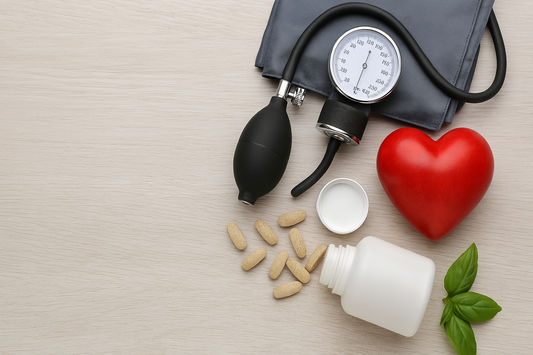What blood pressure is too high?
High blood pressure, also known as hypertension, occurs when the force of blood against the artery walls is consistently too high. It is measured in millimeters of mercury (mm Hg) and is typically considered to be a reading of 130/80 mm Hg or higher. Understanding and managing blood pressure is crucial for maintaining good health.
When blood pressure is elevated, it puts a strain on the heart and blood vessels, increasing the risk of serious health problems. The American Heart Association has established five ranges to categorize blood pressure readings:

- Normal: Blood pressure less than 120/80 mm Hg
- Elevated: Blood pressure between 120-129/less than 80 mm Hg
- Hypertension stage 1: Blood pressure between 130-139/80-89 mm Hg
- Hypertension stage 2: Blood pressure of 140/90 mm Hg or higher
- Hypertensive crisis: Blood pressure higher than 180/120 mm Hg
It is important to note that high blood pressure usually develops over time and can be caused by various factors, including unhealthy lifestyle choices, certain health conditions such as diabetes and obesity, or pregnancy. Uncontrolled hypertension can lead to serious health problems, such as heart attack, stroke, kidney disease, and organ damage.
Key Takeaways:
- High blood pressure occurs when blood force against artery walls is consistently too high
- A reading of 130/80 mm Hg or higher is considered high blood pressure
- American Heart Association categorizes blood pressure into five ranges
- Maintaining a healthy lifestyle is crucial for managing and preventing high blood pressure
- Regular blood pressure check-ups are important for monitoring and managing hypertension
Understanding Blood Pressure Readings
Blood pressure is measured in millimeters of mercury (mm Hg), and hypertension is generally considered to be a blood pressure reading of 130/80 mm Hg or higher. To understand blood pressure readings, it's important to know that they consist of two numbers: systolic pressure and diastolic pressure. The systolic pressure represents the force exerted on the artery walls when the heart contracts and pumps blood, while the diastolic pressure represents the force between heartbeats when the heart is at rest.
When it comes to high blood pressure, both the systolic and diastolic numbers play a significant role. A systolic blood pressure reading above 130 mm Hg and/or a diastolic blood pressure reading above 80 mm Hg is considered elevated. Readings in this range indicate a higher risk for developing hypertension and should be monitored closely.
However, it's important to note that critical blood pressure measurements vary depending on the individual's age, overall health, and other factors. It's advisable to consult a healthcare professional for an accurate diagnosis and personalized guidance regarding blood pressure levels.
The Importance of Monitoring Blood Pressure
Regular monitoring of blood pressure is crucial in identifying and managing high blood pressure. By tracking blood pressure readings over time, individuals can detect any abnormal values and take appropriate actions to prevent complications. It's essential to maintain a healthy lifestyle, including regular exercise, a balanced diet, managing stress levels, and avoiding smoking. These lifestyle modifications can help keep blood pressure within a healthy range and reduce the risk of developing hypertension-related health problems.
Remember, managing high blood pressure requires a comprehensive approach. It's not just about taking medication; it's about making sustainable lifestyle choices that promote overall cardiovascular health. By understanding blood pressure readings and taking necessary steps to manage them effectively, individuals can take control of their cardiovascular health and minimize the risk of serious complications.
| Blood Pressure Category | Systolic Pressure (mm Hg) | Diastolic Pressure (mm Hg) |
|---|---|---|
| Normal | Less than 120 | Less than 80 |
| Elevated | 120-129 | Less than 80 |
| Hypertension Stage 1 | 130-139 | 80-89 |
| Hypertension Stage 2 | 140 or higher | 90 or higher |
| Hypertensive Crisis | Higher than 180 | Higher than 120 |
Categorization of Blood Pressure
The American Heart Association categorizes blood pressure into five ranges: normal, elevated, hypertension stage 1, hypertension stage 2, and hypertensive crisis. These categories help healthcare professionals identify and assess the severity of high blood pressure. Understanding these ranges is crucial in determining appropriate treatment and management strategies for individuals with elevated blood pressure.
- Normal: Blood pressure readings that fall below 120/80 mm Hg are considered normal. This range signifies healthy blood pressure levels and indicates a lower risk of developing hypertension-related complications.
- Elevated: Readings between 120-129 systolic and less than 80 diastolic mm Hg are classified as elevated blood pressure. Although not classified as hypertension, individuals with elevated blood pressure are at a higher risk of developing high blood pressure in the future and should take preventive measures.
- Hypertension Stage 1: Blood pressure readings ranging from 130-139 systolic or 80-89 diastolic mm Hg fall into the hypertension stage 1 category. This range signifies the beginning stages of hypertension and warrants lifestyle modifications and close monitoring.
- Hypertension Stage 2: Readings equal to or exceeding 140 systolic or 90 diastolic mm Hg are categorized as hypertension stage 2. At this stage, individuals are at a significantly higher risk of developing cardiovascular complications and may require medication in addition to lifestyle changes.
- Hypertensive Crisis: Blood pressure measurements exceeding 180/120 mm Hg indicate a hypertensive crisis. This severe condition requires immediate medical attention to prevent organ damage and other life-threatening complications.
It's essential to regularly monitor blood pressure levels and consult with healthcare professionals for proper management. Maintaining a healthy lifestyle, including regular physical activity, a well-balanced diet, stress reduction, and avoiding smoking, can play a significant role in preventing and managing high blood pressure. In some cases, medication may be necessary to control blood pressure and reduce the risk of complications.
In the following sections, we will explore the causes and risks associated with high blood pressure, as well as effective strategies for managing this condition. Stay tuned for more information on maintaining a healthy blood pressure range and preventing hypertension-related complications.
Causes and Risks of High Blood Pressure
High blood pressure usually develops over time and can be caused by unhealthy lifestyle choices, certain health conditions, or pregnancy. Unhealthy lifestyle choices such as a diet high in sodium and fat, lack of physical activity, smoking, and excessive alcohol consumption can contribute to the development of high blood pressure. These choices can lead to weight gain, increased cholesterol levels, and the narrowing of blood vessels, all of which can contribute to elevated blood pressure. In addition, certain health conditions, including diabetes, obesity, and kidney disease, can increase the risk of developing high blood pressure.
During pregnancy, some women may experience a temporary increase in blood pressure, known as gestational hypertension. This condition typically resolves after giving birth, but it can increase the risk of developing high blood pressure later in life. It's important for pregnant women to monitor their blood pressure regularly and consult with their healthcare provider if any concerns arise.
The risks associated with high blood pressure are significant. Uncontrolled hypertension can lead to serious health problems, including heart attack, stroke, kidney disease, and damage to other organs. It's essential to manage high blood pressure effectively to minimize the risk of these complications. This can be achieved through a combination of lifestyle changes and, in some cases, medication.
| Risk Factors for High Blood Pressure | Lifestyle Choices | Health Conditions |
|---|---|---|
| Unhealthy diet | Diabetes | Obesity |
| Lack of physical activity | Kidney disease | |
| Smoking | ||
| Excessive alcohol consumption |
The Importance of Lifestyle Changes
Adopting a healthy lifestyle is key to managing and preventing high blood pressure. It's recommended to follow a balanced diet that includes plenty of fruits, vegetables, whole grains, and lean proteins while limiting sodium, saturated fats, and added sugars. Regular physical activity, such as brisk walking, cycling, or swimming, can help maintain a healthy weight and improve cardiovascular health. Avoiding tobacco use and limiting alcohol consumption can also contribute to blood pressure control.
It's important to note that lifestyle changes may not always be enough to manage high blood pressure, especially in cases of severe hypertension. In such instances, medication may be prescribed by a healthcare professional to help lower blood pressure and reduce the risk of complications. Regular check-ups are crucial for monitoring blood pressure and adjusting treatment plans, if necessary.

In conclusion, high blood pressure can be caused by various factors, including unhealthy lifestyle choices, certain health conditions, and pregnancy. It is essential to manage blood pressure effectively to reduce the risk of serious health problems. Adopting a healthy lifestyle, including a balanced diet, regular exercise, and avoiding tobacco use, can help manage and prevent high blood pressure. In some cases, medication may be necessary to control blood pressure levels. Regular monitoring and follow-up with healthcare professionals are crucial for maintaining optimal blood pressure and overall cardiovascular health.
Managing High Blood Pressure
Maintaining a healthy lifestyle, including regular exercise, a balanced diet, not smoking, and managing stress, can help manage and prevent high blood pressure. Physical activity is crucial in controlling blood pressure as it strengthens the heart and improves circulation. Aim for at least 150 minutes of moderate-intensity aerobic exercise, such as brisk walking or cycling, every week. It is essential to find enjoyable activities to stay motivated and make exercise a regular part of your routine.
Incorporating a balanced diet rich in fruits, vegetables, whole grains, lean proteins, and low-fat dairy products can have a significant impact on blood pressure. Limiting sodium (salt) intake is especially important, as excessive sodium can increase blood pressure. Avoid processed and fast foods, and opt for fresh, homemade meals using herbs and spices to add flavor instead of salt. Additionally, reducing alcohol consumption and avoiding tobacco products can further support healthy blood pressure levels.
| Lifestyle Strategies for Managing High Blood Pressure | Benefits |
|---|---|
| Regular Exercise | Strengthens the heart, improves circulation |
| Balanced Diet | Promotes overall health, reduces sodium intake |
| Limit Alcohol Consumption | Helps maintain healthy blood pressure levels |
| Avoid Tobacco Products | Reduces the risk of cardiovascular disease |
Furthermore, effective stress management can play a vital role in blood pressure control. Engaging in relaxation techniques such as deep breathing exercises, meditation, or yoga can help lower stress levels and promote a sense of calm. Prioritizing self-care, getting enough sleep, and maintaining a positive support system are additional strategies for managing stress effectively.
Remember, while lifestyle modifications are crucial for managing high blood pressure, some individuals may require medication to keep their blood pressure within a healthy range. Regular check-ups with a healthcare professional are essential to monitor blood pressure and make any necessary adjustments to the treatment plan. By taking proactive steps and adopting a holistic approach to managing high blood pressure, individuals can reduce their risk of developing serious health complications.
NutriGrove Blood Pressure Supplement
NutriGrove Blood Pressure Supplement is a great part of a daily routine for lowering blood pressure. When incorporated into a healthy lifestyle, this supplement can provide valuable support in managing hypertension and reducing the risk of serious health problems associated with high blood pressure.
Formulated with carefully selected ingredients known for their positive impact on blood pressure, NutriGrove Blood Pressure Supplement offers a natural and effective solution. The unique blend of nutrients works synergistically to promote healthy blood flow, maintain optimal blood vessel function, and help regulate blood pressure levels.
One key ingredient in NutriGrove Blood Pressure Supplement
is Hawthorn Berry, which has been used for centuries to support cardiovascular health. Research suggests that Hawthorn Berry may help relax and dilate blood vessels, leading to improved blood flow and reduced blood pressure. Another important component is Garlic Extract, known for its potential to lower blood pressure by expanding blood vessels and inhibiting the formation of substances that can constrict them.
When taken as directed, NutriGrove Blood Pressure Supplement can complement lifestyle changes such as regular exercise and a balanced diet, providing an additional boost to your efforts in managing high blood pressure. It is important to note that this supplement is not a substitute for medical advice or prescribed medication. Consult with your healthcare professional before incorporating any new supplements into your routine.
Remember, managing high blood pressure requires a comprehensive approach. By combining healthy lifestyle choices with the support of NutriGrove Blood Pressure Supplement, you can take proactive steps towards maintaining optimal blood pressure levels and promoting overall cardiovascular health.
Key Benefits of NutriGrove Blood Pressure Supplement:
- Supports healthy blood pressure levels
- Promotes optimal blood vessel function
- Enhances blood flow and circulation
- Complements a healthy lifestyle
- Contains carefully selected natural ingredients
Remember, taking care of your blood pressure is essential for your overall well-being. Consider incorporating NutriGrove Blood Pressure Supplement into your daily routine for a healthier heart and a better quality of life.
Section 7: Serious Health Problems Associated with High Blood Pressure
High blood pressure can lead to serious health problems, including heart attack, stroke, kidney disease, and damage to other organs. When the force of blood against the artery walls is consistently too high, it puts a strain on the cardiovascular system. Over time, this strain can lead to the development of various health complications.
A heart attack occurs when the blood flow to the heart is blocked, usually by a blood clot. The increased pressure from high blood pressure can cause the arteries supplying blood to the heart to narrow and harden, making it more difficult for blood to flow freely. This can result in a heart attack, which can be life-threatening and may cause permanent damage to the heart muscle.
Similarly, high blood pressure can also increase the risk of strokes. When the blood vessels leading to the brain become narrowed or blocked, it can disrupt blood flow and oxygen supply, resulting in a stroke. Strokes can cause cognitive impairment, paralysis, and even death, depending on the severity.
Additionally, uncontrolled high blood pressure can damage the kidneys. The kidneys play a crucial role in filtering waste and excess fluid from the blood. Consistently high blood pressure can strain the blood vessels in the kidneys, impairing their function over time. This can lead to kidney disease and, in severe cases, kidney failure, requiring dialysis or a kidney transplant.
It's important to recognize the serious health risks associated with high blood pressure and take proactive steps to manage it effectively. By adopting a healthy lifestyle that includes regular exercise, a balanced diet, not smoking, and managing stress, individuals can help lower their blood pressure and reduce the risk of these complications. Regular check-ups with healthcare professionals are also essential to monitor blood pressure levels and make any necessary adjustments to the treatment plan to maintain optimal health.
Additional Heart Healthy Resources:
- What Should I Do If My Blood Pressure Is Over 160 Over 100
- Does Olive Leaf Lower Blood Pressure?
- Can You Reverse High Blood Pressure?
- What Brings Down Blood Pressure Naturally?
- How Long Should I Water Fast to Lower Blood Pressure?
- What Brings Down Blood Pressure Naturally?
- Can Lack of Sleep Cause High Blood Pressure?
- What are the 5 warning signs for stroke?
- Does Garlic Lower Blood Pressure
- Natural Guide for Effective Blood Pressure Support
- Does Hibiscus Flower Lower Blood Pressure?
Table: Serious Health Problems Associated with High Blood Pressure
| Health Problem | Description |
|---|---|
| Heart Attack | Blockage of blood flow to the heart, potentially causing permanent damage to the heart muscle. |
| Stroke | Disruption of blood flow to the brain, leading to cognitive impairment, paralysis, or even death. |
| Kidney Disease | Impaired kidney function due to high blood pressure, potentially resulting in kidney failure. |
| Organ Damage | Damage to other organs, such as the eyes, arteries, and brain, due to the strain caused by high blood pressure. |
High blood pressure poses significant risks to overall health and well-being. By understanding the potential complications and taking appropriate measures to manage blood pressure, individuals can minimize these risks and ensure a healthier future.

In conclusion, understanding what blood pressure is considered too high is crucial for maintaining overall health and preventing serious complications.
High blood pressure, also known as hypertension, occurs when the force of blood against the artery walls is consistently too high. It is measured in millimeters of mercury (mm Hg) and is generally considered to be a blood pressure reading of 130/80 mm Hg or higher.
The American Heart Association categorizes blood pressure into five ranges: normal (less than 120/80 mm Hg), elevated (120-129/less than 80 mm Hg), hypertension stage 1 (130-139/80-89 mm Hg), hypertension stage 2 (140/90 mm Hg or higher), and hypertensive crisis (blood pressure higher than 180/120 mm Hg).
High blood pressure usually develops over time and can be caused by unhealthy lifestyle choices, certain health conditions (such as diabetes and obesity), or pregnancy. It can lead to serious health problems, including heart attack, stroke, kidney disease, and damage to other organs.
By maintaining a healthy lifestyle, including regular exercise, a balanced diet, not smoking, and managing stress, individuals can effectively manage and prevent high blood pressure. Some people may also need to take medication to control their blood pressure. Regular blood pressure check-ups are vital for monitoring and maintaining optimal blood pressure levels.
FAQ
What blood pressure is considered too high?
High blood pressure, also known as hypertension, is generally considered to be a blood pressure reading of 130/80 mm Hg or higher.
How is blood pressure measured?
Blood pressure is measured in millimeters of mercury (mm Hg) and consists of two readings: systolic pressure (the top number) and diastolic pressure (the bottom number).
What are the categories of blood pressure?
The American Heart Association categorizes blood pressure into five ranges: normal, elevated, hypertension stage 1, hypertension stage 2, and hypertensive crisis.
What are the causes and risks of high blood pressure?
High blood pressure can develop due to unhealthy lifestyle choices, certain health conditions, or pregnancy. It can lead to serious health problems, including heart attack, stroke, kidney disease, and damage to other organs.
How can high blood pressure be managed?
Maintaining a healthy lifestyle, including regular exercise, a balanced diet, not smoking, and managing stress, can help manage and prevent high blood pressure. Some people may also need to take medication to control their blood pressure.
What are the serious health problems associated with high blood pressure?
Uncontrolled high blood pressure can increase the risk of heart attack, stroke, kidney disease, and damage to other organs.






